What began as a doctoral dissertation on the Urdu-speaking community in Bangladesh transformed into a labyrinth of interesting possibilities for IIIT Hyderabad’s historian and social scientist, Dr. Isha Dubey. She elaborates on her research into Mumbai’s Bhendi Bazaar, the multi-dimensional global study of the Dawoodi Bohra community and her other research projects.
Dr. Isha Dubey joined IIIT Hyderabad’s Human Sciences Research Group (HSRG) as an Assistant professor in December 2022. The Ph.D in History from Aarhus University, Denmark (2017) has had two post-doctoral stints in Sweden and Denmark, that would prepare her for a faculty position at IIIT Hyderabad. “I’m a historian and conventionally trained social scientist who works in the domains of migration, displacement, urban history and identity politics, nationalism and memory studies in contemporary South Asia, with particular emphasis on the Partition of 1947, the 1971 Bangladesh War, urban redevelopment and shifting narratives of belonging, spanning three countries and more than seven decades,” explains Isha who is still discovering the scope and possibilities of working on these themes in a technology-centric research Institute.
From Patna to Scandinavia via Delhi
Isha grew up in small-town Patna and moved to the national capital in 2005, after finishing school from one of its oldest all-girls’ convent schools, Notre Dame Academy. Here began her long and continuing engagement with the discipline of history, as she pursued her B. A (Honors), M.A and M.Phil. in History, specializing in Modern India from the University of Delhi and Jawaharlal Nehru University.
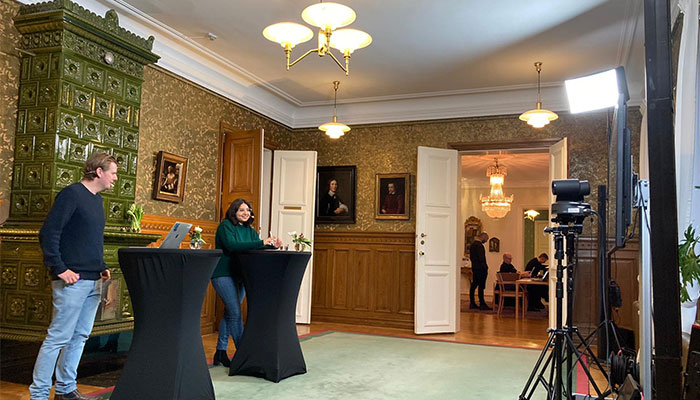
She moved to Denmark in 2013 for her doctoral studies at Aarhus University, funded by the IBIES Erasmus Mundus Scholarship. Isha was awarded her Ph. D in 2017 and stayed back as a visiting faculty researcher. Her Scandinavian adventure would continue at Sweden’s Lund University, as a postdoctoral researcher at the Swedish South Asian Studies network (SASNET). While at Lund, Isha was also simultaneously applying to faculty positions, IIIT Hyderabad being one of them. “By the summer of 2022, I was offered the position at IIITH. Elated as I was, I couldn’t join till December 2022 because of my ongoing second post-doctoral research and teaching commitments at Aarhus University. IIIT Hyderabad was immensely accommodating and not only was my joining date deferred, but I also got to continue my association with the Aarhus research project as a co-collaborator through an MoU between AU and IIIT Hyderabad!”
Bhendi Bazaar – a microcosm of the mercantile Dawoodi Bohras
The MoU allows Isha to continue her post-doctoral work on a large Danish Research Council funded project – Constructing the Oceans: Thick Transregionalism and Indian Ocean Infrastructures (CO-OC). It focuses on community-led infrastructure projects, investigating how trans-regional relations play out in the everyday lives and social imaginaries of the Dawoodi Bohra community residing in the port cities of Mumbai, Dar es Salaam (Tanzania), Dubai (UAE) and Cairo (Egypt). The multi-sided ethnographic project looks at the community’s engagement with ideas of history, progress, tradition and modernity as they undertake massive infrastructure projects in these locations – both faith-related and secular.
“My project within CO-OC focuses on Mumbai’s Bhendi Bazaar precinct, as it undergoes this massive transformation. It aims to unpack the dynamics of the entanglements between the ‘social’ and the ‘material’ dimensions of the locality and the ways in which the Dawoodi Bohras – its most populous and prominent community – inhabit them. We have certain publication plans coming out of the Bohra project and there is a big conference of Indian Ocean Studies scholars coming up in Denmark this summer”, she reports. “In fact, based on some of the ideas and interests emerging from the CO-OC’s Bhendi Bazaar project, I shall be using the seed grant offered by IIIT Hyderabad for a research project on how the Partition of 1947 altered the fabric of post-colonial Bombay and how migration has made the city what it is”.
Nudging the boundaries between tech and society
As faculty and supervisor for dual degree students at HSRC, Isha is finding her way around what she says is a very exciting program. “As a Center, we are still trying to define in what ways we can bring our expertise as social scientists, to grapple with questions in a world which is increasingly playing out in a digital landscape. IIITH is a great place to be doing this as it is already embedded in this new world”, explains the historian who is working with two dual degree research students in the CHD program currently. She is also teaching the second iteration of her elective Migrants and Migrations in Modern South Asia which combines her expertise in migration studies and theory, with specific cases of mobility in South Asian history as well as two core courses on Research Methods in the Human Sciences and Making of the Contemporary World.
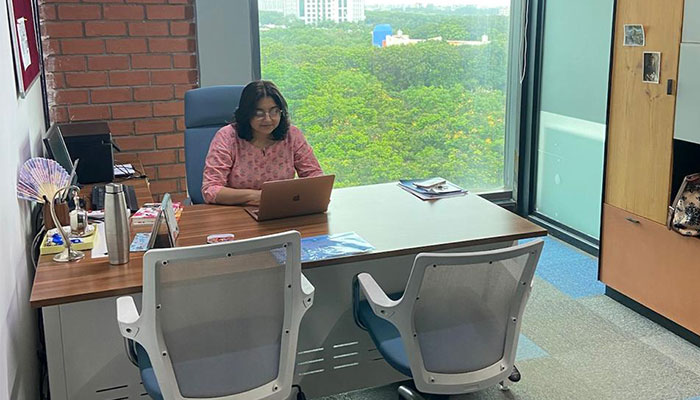
Chronicling Bangladesh’s difficult heritage
Beyond the CO-OC project, Isha’s larger post-Ph.D research agenda engages with questions of forgetting and memorialization, particularly how the two partitions that Bangladesh experienced (1947,1971) are remembered, by different communities within the nation and how they engage with the national memory of these events. While Isha looked at some of these themes during her doctoral and post-doctoral studies, a project that she has long been planning on putting together, is one that seeks to understand the intergenerational transmission of historical trauma from 1971, and the generation of its postmemory in contemporary Bangladesh among its Urdu-speaking and Hindu communities.
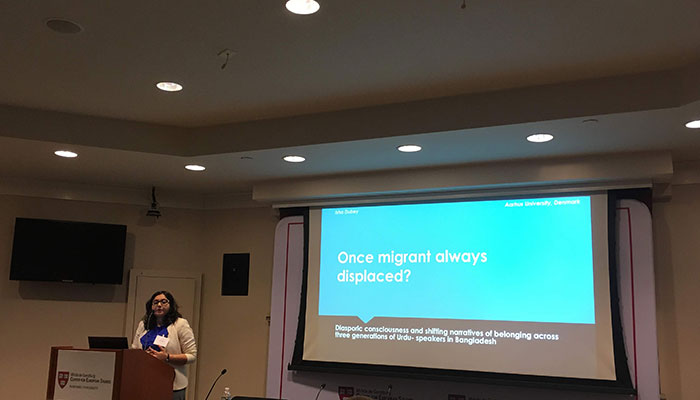
Conversations and early influences
One could point out that Isha comes from a family of teachers and academics. Her grandfather was a professor of political science and retired as the Vice Chancellor of Magadha University, a prominent state university in Bihar. Her mother is a physics professor in Jamshedpur and her father recently retired as professor of philosophy after a long and fulfilling career in higher education.
Dining table conversations in the Dubey household would revolve around her grandfather’s memories of growing up in colonial India and his impassioned analysis of Indian politics. “Of course we also talked about films, books and extended family gossip”, smiles Isha who credits her interest in the social sciences and history to her grandfather, who was a major influence on her. “He was an extraordinary man who has lived through some extraordinary times! So often he would talk about living through the Independence struggle, Partition days and participating in the Quit India movement, that he really became my window into that time”. An expert on the Indian Constitution, he also had the constitutions of countries like the US, UK and France on his fingertips.
As a young girl in small-town India, Isha grew up reading the usual children’s fiction by Enid Blyton, the Nancy Drew and Hardy Boys mysteries. But even then, she would find certain gender and racial stereotypes in these books peculiar. Why are the girls in Famous Five always putting together the picnic basket and why does George have to be a tomboy to be cool?
Isha trained in classical music and played the harmonium during her school years. “Nowadays, I listen to anything that sounds nice. Old Bollywood songs are my all-time favorites”, she says. Her go to exercise is swimming. Her European sojourn made her admire the Scandinavian ability to achieve work-life balance. “I was lucky to have had a wonderful set of friends from all nationalities at Aarhus and Lund. I continue to work with some of them, like my current PI on the Bohra project, who was my former supervisor”.
When she is not immersed in her research studies, Isha tries to make time to read whodunits, romances, some Amitav Ghosh and fantasy fiction. “So much of our work is cerebral that its tough to switch off. But when I do, traveling really rejuvenates and helps you to concentrate more on the things that you need to do. During my eight years in Europe, I have covered most of it but Budapest still remains my favorite”. Isha’s husband Sunil is a lawyer practicing in the Bombay High Court.
IIIT Hyderabad and its chilled work culture
“I have a wonderful bunch of colleagues at IIIT Hyderabad”, notes Isha gratefully. “I had never worked in India before and I was apprehensive about the transition. But IIIT has really been the smoothest transition one could hope for because of the flexibility it gives us, to do our own thing. Several opportunities are given through different events, to interact with colleagues even beyond the department and center. Living on campus is an added advantage to really soak in the essence of the place, giving you that ease of access to participate in the life of the Institute in so many ways”.
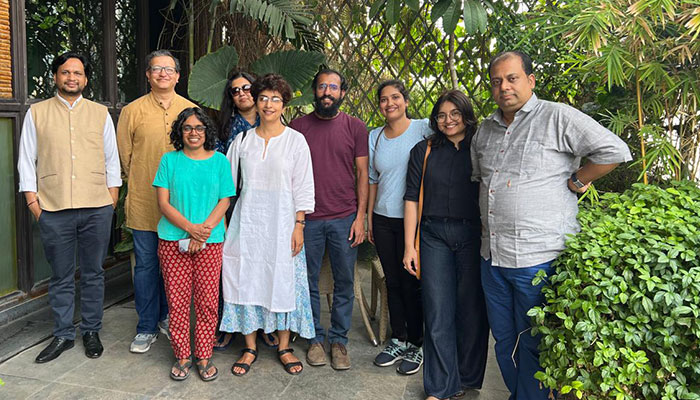
“This is my first time in Hyderabad and I really like the city”, she adds. “It has the best of both worlds; blending the cosmopolitan with an interesting history. I really like where we are located within it. You have this really great green haven to yourself and when you get out of the campus gates, there’s the city with its nice cafes, great street food and entertainment, within your reach”.
“My bucket list is to make more time for my own research, to be able to write more, get all the things that are in the pipeline out, and to travel more”, she muses. “And somehow to carve out a routine where I am able to do justice to everything on my to-do list in equal measure”.
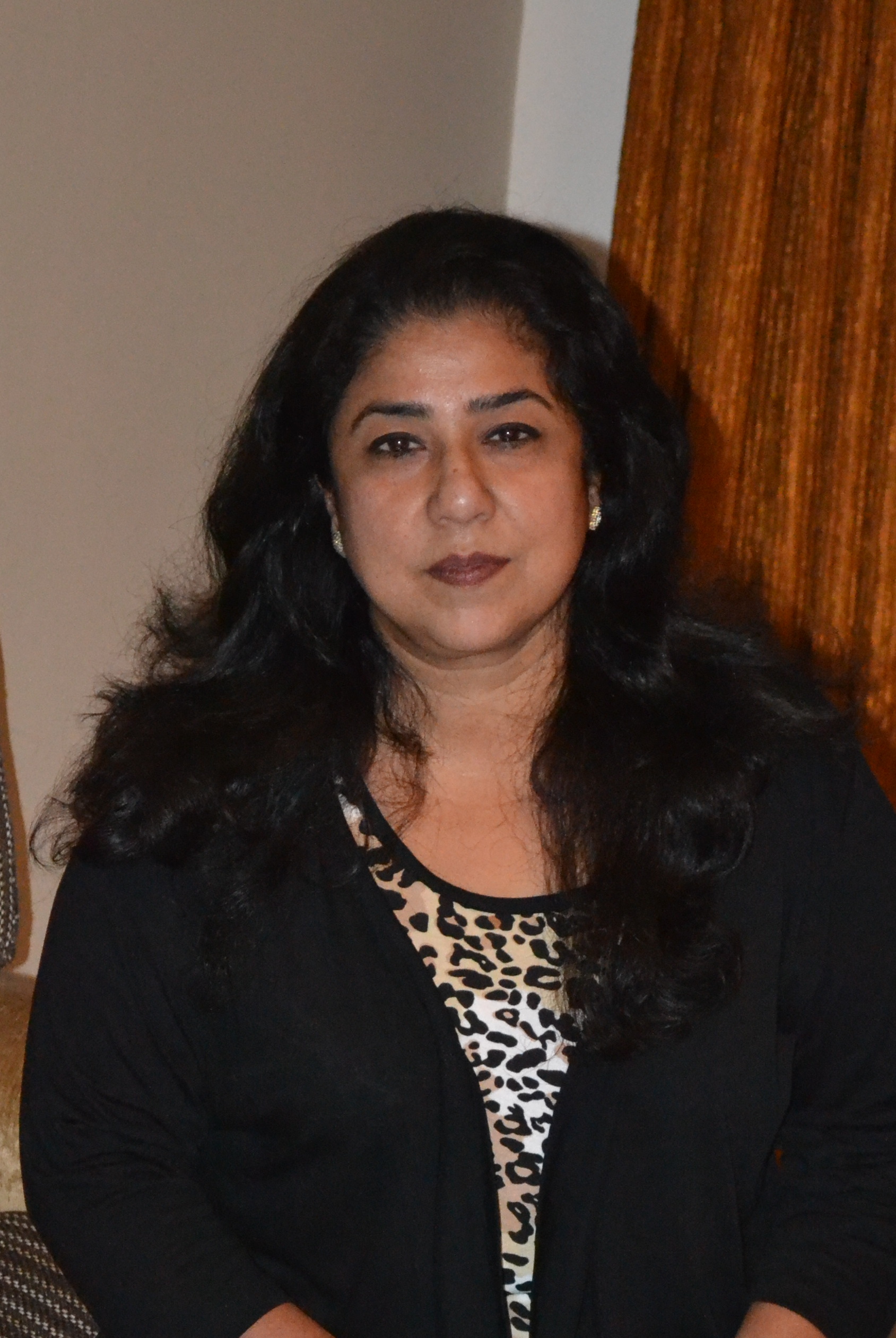
Deepa Shailendra is a freelance writer for interior design publications; an irreverent blogger, consultant editor and author of two coffee table books. A social entrepreneur who believes that we are the harbingers of the transformation and can bring the change to better our world.

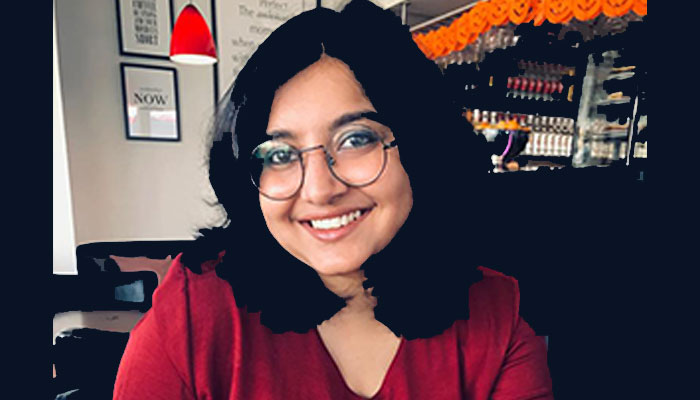
Next post